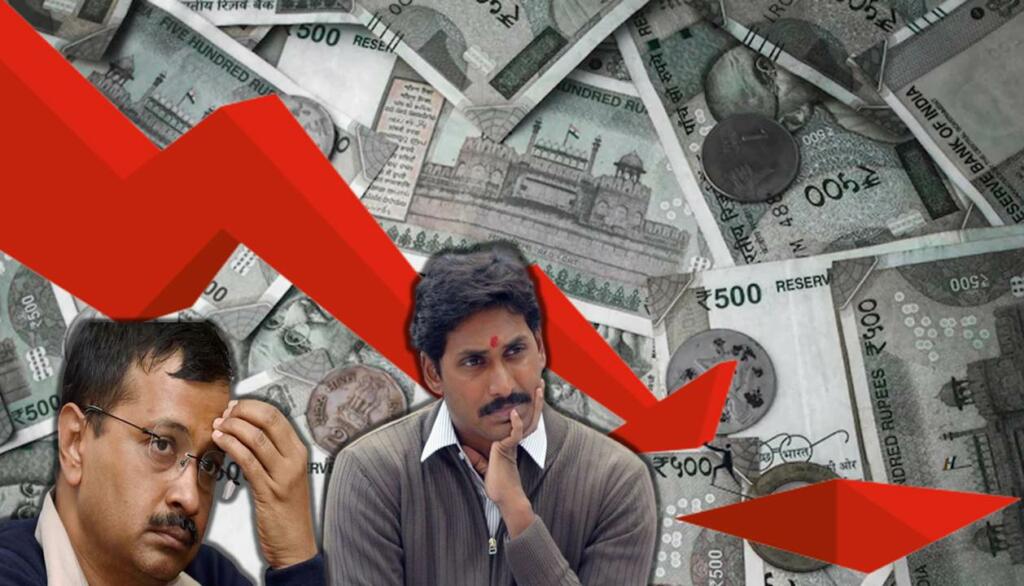- Andhra Pradesh government has announced that it is going to double the number of districts in the state to increase efficiency
- It was one of the populist poll promises. Various bureaucrats have expressed dissatisfaction with PM Modi against such practices
- Though, initially well-intentioned, freebies have become a tool to garner votes from gullible masses, in turn destroying the economy
India has emerged as one of the strongest pillars of the Global economy in the post-pandemic world order. But, some states are taking advantage of the strong fundamentals of our economy. Their populist measures are slowly but steadily wrecking finances.
Reddy government doubles the number of districts in Andhra
In a decision, supposedly taken with a view to increase administrative efficiency, the Jagan Mohan Reddy government has carved out a new map for the state of Andhra Pradesh. Earlier, the number of districts in the state was 13, which has now doubled to 26. Apparently, this was done to fulfill the poll promise made by Reddy in the 2019 assembly elections. Reddy government said that it will improve the delivery of services.
In a statement, the state government said, “With the formation of smaller districts – distance from the district center to remote and border villages will be reduced… District administration will come closer to the people… Increased accountability as the Government comes closer to people,”
A toy that costs more than the child
Though on its face, the move is well-intentioned, but deeper analysis suggests that it can cause a big dent in the state’s treasury. Doubling the number of districts means doubling the state machinery required to cater to the public. If the plan is to bring offices closer to people, then more manpower has to be recruited.
More buildings, more staff, and more infrastructure spending from the state coffers is going to become the norm. Additionally, Andhra will also be requiring more administrative officers (both state and central) to manage the affairs from the top. Effectively, the move is expected to become a toy that costs more than the child.
Bureaucrats’ concern
The issue of excess state spending was recently raised in PM Modi’s meeting with top bureaucrats of the country. The officials who are in touch with both theoretical and practical aspects of freebies opined that it could create a Sri Lanka-like hunger crisis in the country.
According to a report by the Times of India, officials cited announcements of populist schemes by four states as examples of poor management of state finances. Apart from the Reddy government’s freebies in Andhra Pradesh, respective freebies were announced by state governments of Punjab and Delhi (AAP), West Bengal (TMC), and Telangana (TRS) were also mentioned in the meeting as fiscally unsustainable.
Read more: Mamata’s freebies take a heavy toll upon state’s infrastructure as govt slashes PWD budget by 60%
Analysis of AAP’s populist promise in Punjab
Politicians do not even think for a whisker before announcing such policies. For example, recently the Kejriwal-led AAP announced free electricity for the state as well as Rs 1000 per month if they come to power. Practically, it’s impossible to implement without destroying the state’s finances.
Read more: Kejriwal’s freebies mutate into giant potholes and mini rivers on Delhi roads
Punjab does not have an efficient system of generating its own revenues. While on average states and Union territories in India generate about 46.2 percent of their total revenues from taxes inside their geography, Punjab only generated only 39.3 percent. Its non-tax revenues generally stay around 8 percent of total revenues. The rest of its revenue comes from mandatory transfer by the center as well as a share in the tax collected by the Union government.
In spite of availing one of the highest grants from the central government (in percentage terms), Punjab is left with effectively 2.73 lakh crore to pay to its debtors. Now, Kejriwal’s announcement of freebies has further increased the burden. Recently, the AAP government in Punjab demanded Rs 1 lakh crore from the Modi government as financial aid.
BJP’s populism is unnoticed but effective
It is not that BJP does not cater to public demands. But, BJP’s spending is focused more on creating stable infrastructure in the country, rather than getting some free brownie points during elections. Modi’s government has focussed on building highways, rural roads, housing, transport, cargo terminals, and potable tap water connections. In fact, in the budget for the year 2022, Nirmala Sitharaman increased the government’s allocation for key infrastructure segments by huge margins.
The government allocated nearly 2 lakh crore for Highway construction, a 60 percent jump over the last year. Similarly, the overall allocation for the transport sector witnessed a steep 40 percent rise as it went up from 2.3 lakh crore in the previous year to 3.5 lakh crore in the current fiscal year.
Read more: Plans to take up work worth 15 trillion rupees in highways, says Nitin Gadkari
Politicians are just milking votes in the name of poor
Hierarchy is a default feature of civilization. But, those who are at lower rungs, need the state’s benefits from time to time. However, if a politician starts to leverage that for short-term political gains, then it defeats the purpose of welfare. Moreover, those who benefit from these schemes also can not develop on their own, which may be what these political parties want.
Read more: Freebie in the agriculture sector can become the reason behind India’s next NPA crisis
They do not want a population that can feed itself, they want a population that they can manipulate through pecuniary promises. By doing it, they are not just harming these individuals in the long run, but are also sending the country into the perils of economic destruction.
